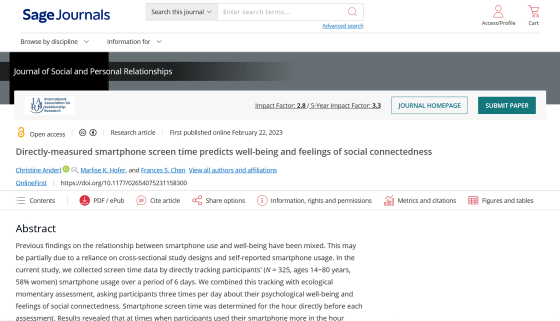Research results show that as time spent using smartphones increases, people feel less connected to society, leading to a vicious cycle in which smartphone use increases even more.

The day goes by in the blink of an eye when you're watching SNS or video sites on your smartphone, and many people have found themselves spending less time with family and friends these days. A study conducted by a Canadian research team revealed a vicious cycle in which ``the more people use their smartphones, the more they feel disconnected from society, which in turn increases the amount of time they use their smartphones.''
Directly-measured smartphone screen time predicts well-being and feelings of social connectedness - Christine Anderl, Marlise K. Hofer, Frances S. Chen, 2023

New study uncovers a 'vicious cycle' between feeling less socially connected and increased smartphone use
https://www.psypost.org/2023/09/new-study-uncovers-a-vicious-cycle-between-feeling-less-socially-connected-and-increased-smartphone-use-212978
In modern society, many people use smartphones on a daily basis, and it is not uncommon for some to touch their smartphones all day long. Therefore, a lot of research is being conducted on the impact of smartphones on people's mental health, but these studies often rely on self-reports to measure smartphone usage time, which is one of the limitations of the research. I am.
To solve this problem, a research team at the University of British Columbia in Canada conducted a study to track the screen time that subjects actually used on smartphones and examine the relationship with happiness and social connections.
The research team recruited 325 Android users between the ages of 14 and 80 and had them install an app called ``BeTrack'' that tracks screen time. Additionally, participants were sent three random notifications per day through the app and surveyed about their happiness and social connections. We investigated the impact of smartphone use on offline social interactions.

Analysis of the experimental data revealed that the longer the time spent using a smartphone in the hour immediately before answering the survey, the lower the level of happiness at the time of the survey. However, this negative effect was partially offset by offline social interaction in the previous hour.
'We found that using a smartphone more in the hour before the survey was associated with lower levels of happiness at that time, but we found no evidence for the opposite pathway,' the researchers wrote in their paper. 'This suggests that smartphone use may lead to decreased happiness, but not the other way around.'
Furthermore, it was suggested that not only increased smartphone use time was associated with a decrease in social connections, but also that decreased social connections predicted increases in smartphone use time. In other words, if you feel that your social connections are weak, you will spend more time using your smartphone, which in itself will make you feel that your social connections are weaker, which will further increase the amount of time you use your smartphone, creating a vicious cycle. is. The research team claims, ``This bidirectional association indicates a complex relationship between social connections and smartphone use, and may point to the risk of a vicious cycle.'' Did.

In addition, scientific media PsyPost points out that this research is based on observation, and it is important to note that it did not find a cause-and-effect relationship and that it only targeted Android users. .
Related Posts:







